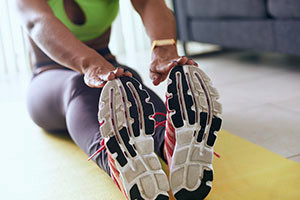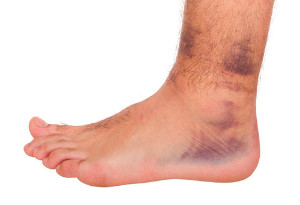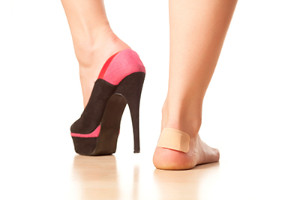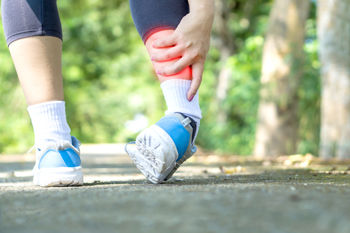Connect With Us
Blog
Items filtered by date: October 2019
Stretching and Wearing the Correct Running Shoes
 Many people have a strong desire to run in a marathon. Research has indicated the importance of warming up properly as the training regime begins, and this may be helpful in preventing running injuries. An injury to the plantar fascia typically starts by noticing pain in the heel. It is recommended that the calves and arches are properly stretched before beginning the physical training that is necessary to run a marathon. This can help to keep the muscles and tendons flexible. Ankle injuries may be avoided by performing heel drops, which can help to build strength in the ankles. Additionally, it is helpful to wear running shoes that are made of a lightweight material, and have adequate cushioning. If you enjoy the sport of running, and would like additional information about how the feet may be affected by running injuries, please consult with a podiatrist.
Many people have a strong desire to run in a marathon. Research has indicated the importance of warming up properly as the training regime begins, and this may be helpful in preventing running injuries. An injury to the plantar fascia typically starts by noticing pain in the heel. It is recommended that the calves and arches are properly stretched before beginning the physical training that is necessary to run a marathon. This can help to keep the muscles and tendons flexible. Ankle injuries may be avoided by performing heel drops, which can help to build strength in the ankles. Additionally, it is helpful to wear running shoes that are made of a lightweight material, and have adequate cushioning. If you enjoy the sport of running, and would like additional information about how the feet may be affected by running injuries, please consult with a podiatrist.
All runners should take extra precaution when trying to avoid injury. If you have any concerns about your feet, contact Scott Matthews, DPM, MD of Salem Foot Care . Our doctor will treat your foot and ankle needs.
How to Prevent Running Injuries
There are a lot of mistakes a runner can make prior to a workout that can induce injury. A lot of athletes tend to overstretch before running, instead of saving those workouts for a post-run routine. Deep lunges and hand-to-toe hamstring pulls should be performed after a workout instead of during a warmup. Another common mistake is jumping into an intense routine before your body is physically prepared for it. You should try to ease your way into long-distance running instead of forcing yourself to rush into it.
More Tips for Preventing Injury
- Incorporate Strength Training into Workouts - This will help improve the body’s overall athleticism
- Improve and Maintain Your Flexibility – Stretching everyday will help improve overall performance
- “Warm Up” Before Running and “Cool Down” Afterward – A warm up of 5-10 minutes helps get rid of lactic acid in the muscles and prevents delayed muscle soreness
- Cross-Training is Crucial
- Wear Proper Running Shoes
- Have a Formal Gait Analysis – Poor biomechanics can easily cause injury
If you have any questions, please feel free to contact our office located in Wikesboro, NC . We offer the newest diagnostic and treatment technologies for all your foot care needs.
Water Retention During Pregnancy May Affect The Feet
 Many pregnant women are aware of water retention in the body as the pregnancy progresses. This typically affects the feet, and causes swelling in the lower extremities. This is a result of an increase in hormones, sodium, and potassium levels that occur during pregnancy. It is helpful to elevate the legs as often as possible, and this may bring moderate relief to throbbing feet. Many pregnant women find it beneficial to limit the amount of salt that is ingested, which is important in regulating water retention. Research has indicated it is helpful to drink plenty of water daily, in addition to performing a gentle exercise routine. If you have concerns about how pregnancy can affect the feet, it is suggested you counsel with a podiatrist.
Many pregnant women are aware of water retention in the body as the pregnancy progresses. This typically affects the feet, and causes swelling in the lower extremities. This is a result of an increase in hormones, sodium, and potassium levels that occur during pregnancy. It is helpful to elevate the legs as often as possible, and this may bring moderate relief to throbbing feet. Many pregnant women find it beneficial to limit the amount of salt that is ingested, which is important in regulating water retention. Research has indicated it is helpful to drink plenty of water daily, in addition to performing a gentle exercise routine. If you have concerns about how pregnancy can affect the feet, it is suggested you counsel with a podiatrist.
Pregnant women with swollen feet can be treated with a variety of different methods that are readily available. For more information about other cures for swollen feet during pregnancy, consult with Scott Matthews, DPM, MD from Salem Foot Care . Our doctor will attend to all of your foot and ankle needs.
What Foot Problems Can Arise During Pregnancy?
One problem that can occur is overpronation, which occurs when the arch of the foot flattens and tends to roll inward. This can cause pain and discomfort in your heels while you’re walking or even just standing up, trying to support your baby.
Another problem is edema, or swelling in the extremities. This often affects the feet during pregnancy but tends to occur in the later stages.
How Can I Keep My Feet Healthy During Pregnancy?
- Wearing orthotics can provide extra support for the feet and help distribute weight evenly
- Minimize the amount of time spent walking barefoot
- Wear shoes with good arch support
- Wear shoes that allow for good circulation to the feet
- Elevate feet if you experience swelling
- Massage your feet
- Get regular, light exercise, such as walking, to promote blood circulation to the feet
If you have any questions please feel free to contact our office located in Wikesboro, NC . We offer the newest diagnostic and treatment technologies for all your foot and ankle needs.
Painful Ankle Sprains
 There are ligaments and tendons that surround the ankle which connect the bones to the feet. If an injury should occur that stretches or tears the tendons, the result may be an ankle sprain. A common reason ankle sprains occur may come from twisting the ankle by suddenly stepping off a curb. The typical symptoms that many patients experience can be severe pain and discomfort, swelling, and it may be difficult to walk. After a proper diagnosis is performed, which generally includes having an X-ray taken, the proper treatment can begin. The affected foot may feel better when it is wrapped with an elastic bandage, and this may help to provide adequate support. For severe sprains, it may be impossible to put any weight on the foot, and crutches may be needed for mobility. There are measures that can be taken which may reduce the risk of enduring a sprained ankle. These may include wearing shoes that fit properly, performing exercises that can strengthen the ankles, and being aware when walking on uneven surfaces. If you have sprained your ankle, it is advised that you consult with a podiatrist who can discuss the best treatment options for you.
There are ligaments and tendons that surround the ankle which connect the bones to the feet. If an injury should occur that stretches or tears the tendons, the result may be an ankle sprain. A common reason ankle sprains occur may come from twisting the ankle by suddenly stepping off a curb. The typical symptoms that many patients experience can be severe pain and discomfort, swelling, and it may be difficult to walk. After a proper diagnosis is performed, which generally includes having an X-ray taken, the proper treatment can begin. The affected foot may feel better when it is wrapped with an elastic bandage, and this may help to provide adequate support. For severe sprains, it may be impossible to put any weight on the foot, and crutches may be needed for mobility. There are measures that can be taken which may reduce the risk of enduring a sprained ankle. These may include wearing shoes that fit properly, performing exercises that can strengthen the ankles, and being aware when walking on uneven surfaces. If you have sprained your ankle, it is advised that you consult with a podiatrist who can discuss the best treatment options for you.
Although ankle sprains are common, they aren’t always minor injuries. If you need your ankle injury looked at, contact Scott Matthews, DPM, MD from Salem Foot Care . Our doctor can provide the care you need to keep you pain-free and on your feet.
How Does an Ankle Sprain Occur?
Ankle sprains are the result of a tear in the ligaments within the ankle. These injuries may happen when you make a rapid shifting movement while your foot is planted. A less common way to sprain your ankle is when your ankle rolls inward while your foot turns outward.
What Are the Symptoms?
- Pain at the sight of the tear
- Bruising/Swelling
- Ankle area is tender to touch
- In severe cases, may hear/feel something tear
- Skin discoloration
Preventing a Sprain
- Wearing appropriate shoes for the occasion
- Stretching before exercises and sports
- Knowing your limits
Treatment of a Sprain
In many cases, the RICE method (Rest, Ice, Compression, and Elevate) is used to treat ankle sprains. However, you should see a podiatrist to see which treatment option would work best with your injury. In severe cases, surgery may be required.
It is important to ask your doctor about rehab options after you receive treatment for your injury. Stretching, strength training, and balance exercises may help the ankle heal while also preventing further injury.
If you have any questions, please feel free to contact our office located in Wikesboro, NC . We offer the newest diagnostic and treatment technologies for all your foot care needs.
Are High Heels Good for Your Feet?
 If you frequently wear high heels, you may be prone to having sore and aching feet. This may be a result of the unnatural position the feet are in while wearing these types of shoes. There may be specific foot conditions that can develop from wearing high heels. These can include ingrown toenails and hammertoes, which can happen if there is a limited amount of room for the toes to move freely in. Additionally, it may be easier to fall, which may cause an ankle injury. If you choose to wear high heels, it may be beneficial to alternate days by wearing shoes with a lower heel. Research has indicated it may be beneficial to perform gentle stretches, which may help to strengthen the calves and to keep the feet strong. If you would like additional information about the possible dangers high heels can have on the feet, please consult with a podiatrist.
If you frequently wear high heels, you may be prone to having sore and aching feet. This may be a result of the unnatural position the feet are in while wearing these types of shoes. There may be specific foot conditions that can develop from wearing high heels. These can include ingrown toenails and hammertoes, which can happen if there is a limited amount of room for the toes to move freely in. Additionally, it may be easier to fall, which may cause an ankle injury. If you choose to wear high heels, it may be beneficial to alternate days by wearing shoes with a lower heel. Research has indicated it may be beneficial to perform gentle stretches, which may help to strengthen the calves and to keep the feet strong. If you would like additional information about the possible dangers high heels can have on the feet, please consult with a podiatrist.
High heels have a history of causing foot and ankle problems. If you have any concerns about your feet or ankles, contact Scott Matthews, DPM, MD from Salem Foot Care . Our doctor can provide the care you need to keep you pain-free and on your feet.
Effects of High Heels on the Feet
High heels are popular shoes among women because of their many styles and societal appeal. Despite this, high heels can still cause many health problems if worn too frequently.
Which Parts of My Body Will Be Affected by High Heels?
- Ankle Joints
- Achilles Tendon – May shorten and stiffen with prolonged wear
- Balls of the Feet
- Knees – Heels cause the knees to bend constantly, creating stress on them
- Back – They decrease the spine’s ability to absorb shock, which may lead to back pain. The vertebrae of the lower back may compress.
What Kinds of Foot Problems Can Develop from Wearing High Heels?
- Corns
- Calluses
- Hammertoe
- Bunions
- Morton’s Neuroma
- Plantar Fasciitis
How Can I Still Wear High Heels and Maintain Foot Health?
If you want to wear high heeled shoes, make sure that you are not wearing them every day, as this will help prevent long term physical problems. Try wearing thicker heels as opposed to stilettos to distribute weight more evenly across the feet. Always make sure you are wearing the proper shoes for the right occasion, such as sneakers for exercising. If you walk to work, try carrying your heels with you and changing into them once you arrive at work. Adding inserts to your heels can help cushion your feet and absorb shock. Full foot inserts or metatarsal pads are available.
If you have any questions please feel free to contact our office located in Wikesboro, NC . We offer the newest diagnostic and treatment technologies for all your foot and ankle needs.
Symptoms of an Achilles Tendon Injury
 If you are experiencing pain in the calf and in the back of the heel, you may have what is known as an Achilles tendon injury. This type of injury can produce severe discomfort, and it may be difficult to walk. It is a common ailment among people who enjoy running, and may occur from a lack of stretching the muscles before running or jogging begins. Additionally, it may develop as a result of wearing shoes that do not fit correctly, or from an abrupt change in participating in sporting activities. The Achilles tendon connects the heel to the calf muscles, and if it should become inflamed, Achilles tendinopathy may occur. Some of the symptoms that are associated with this type of injury can include stiffness in the ankle and calf, and the first steps taken after arising in the morning may be uncomfortable. If you have any pain in the heel and the calf, it is strongly suggested that you speak to a podiatrist as quickly as possible who can properly diagnosis and treat an Achilles tendon injury.
If you are experiencing pain in the calf and in the back of the heel, you may have what is known as an Achilles tendon injury. This type of injury can produce severe discomfort, and it may be difficult to walk. It is a common ailment among people who enjoy running, and may occur from a lack of stretching the muscles before running or jogging begins. Additionally, it may develop as a result of wearing shoes that do not fit correctly, or from an abrupt change in participating in sporting activities. The Achilles tendon connects the heel to the calf muscles, and if it should become inflamed, Achilles tendinopathy may occur. Some of the symptoms that are associated with this type of injury can include stiffness in the ankle and calf, and the first steps taken after arising in the morning may be uncomfortable. If you have any pain in the heel and the calf, it is strongly suggested that you speak to a podiatrist as quickly as possible who can properly diagnosis and treat an Achilles tendon injury.
Achilles tendon injuries need immediate attention to avoid future complications. If you have any concerns, contact Scott Matthews, DPM, MD of Salem Foot Care . Our doctor can provide the care you need to keep you pain-free and on your feet.
What Is the Achilles Tendon?
The Achilles tendon is a tendon that connects the lower leg muscles and calf to the heel of the foot. It is the strongest tendon in the human body and is essential for making movement possible. Because this tendon is such an integral part of the body, any injuries to it can create immense difficulties and should immediately be presented to a doctor.
What Are the Symptoms of an Achilles Tendon Injury?
There are various types of injuries that can affect the Achilles tendon. The two most common injuries are Achilles tendinitis and ruptures of the tendon.
Achilles Tendinitis Symptoms
- Inflammation
- Dull to severe pain
- Increased blood flow to the tendon
- Thickening of the tendon
Rupture Symptoms
- Extreme pain and swelling in the foot
- Total immobility
Treatment and Prevention
Achilles tendon injuries are diagnosed by a thorough physical evaluation, which can include an MRI. Treatment involves rest, physical therapy, and in some cases, surgery. However, various preventative measures can be taken to avoid these injuries, such as:
- Thorough stretching of the tendon before and after exercise
- Strengthening exercises like calf raises, squats, leg curls, leg extensions, leg raises, lunges, and leg presses
If you have any questions please feel free to contact our office located in Wikesboro, NC . We offer the newest diagnostic tools and technology to treat your foot and ankle needs.
Blog Archives
- April 2025
- March 2025
- February 2025
- January 2025
- December 2024
- November 2024
- October 2024
- September 2024
- August 2024
- July 2024
- June 2024
- May 2024
- April 2024
- March 2024
- February 2024
- January 2024
- December 2023
- November 2023
- October 2023
- September 2023
- August 2023
- July 2023
- June 2023
- May 2023
- April 2023
- March 2023
- February 2023
- January 2023
- December 2022
- November 2022
- October 2022
- September 2022
- August 2022
- July 2022
- June 2022
- May 2022
- April 2022
- March 2022
- February 2022
- January 2022
- December 2021
- November 2021
- October 2021
- September 2021
- August 2021
- July 2021
- June 2021
- May 2021
- April 2021
- March 2021
- February 2021
- January 2021
- December 2020
- November 2020
- October 2020
- September 2020
- August 2020
- July 2020
- June 2020
- May 2020
- April 2020
- March 2020
- February 2020
- January 2020
- December 2019
- November 2019
- October 2019
- September 2019
- August 2019
- July 2019
- June 2019
- May 2019
- April 2019
- March 2019
- February 2019
- January 2019
- December 2018
- November 2018
- October 2018
- September 2018
- August 2018
- July 2018
- June 2018
- May 2018

